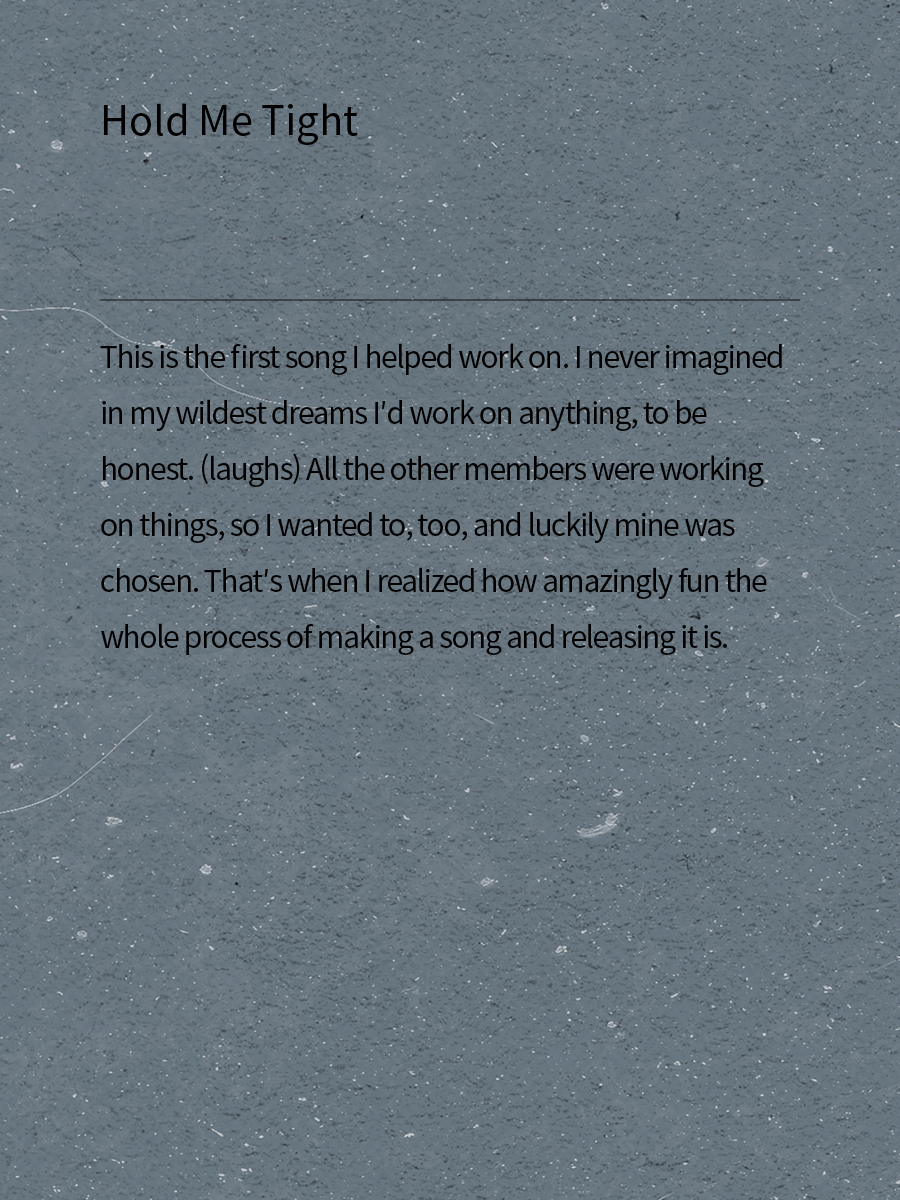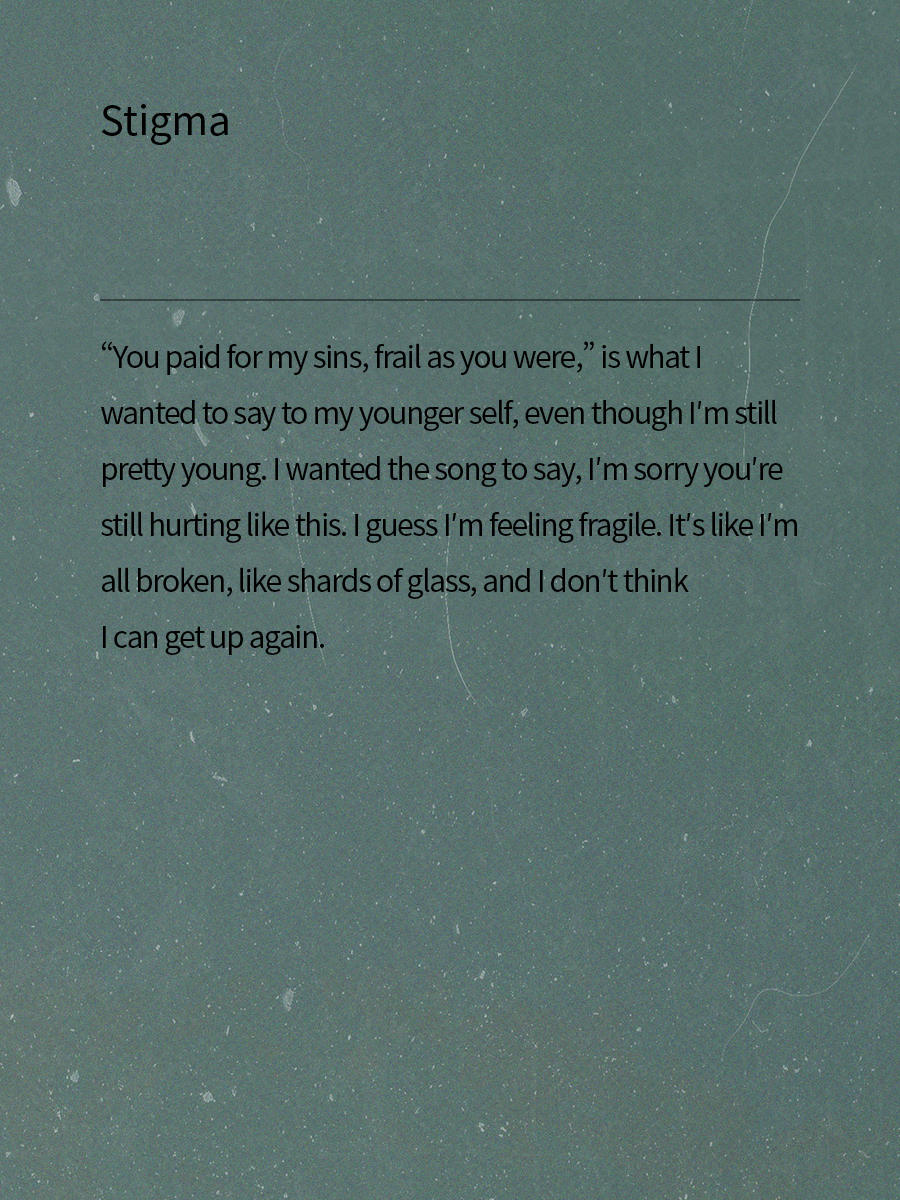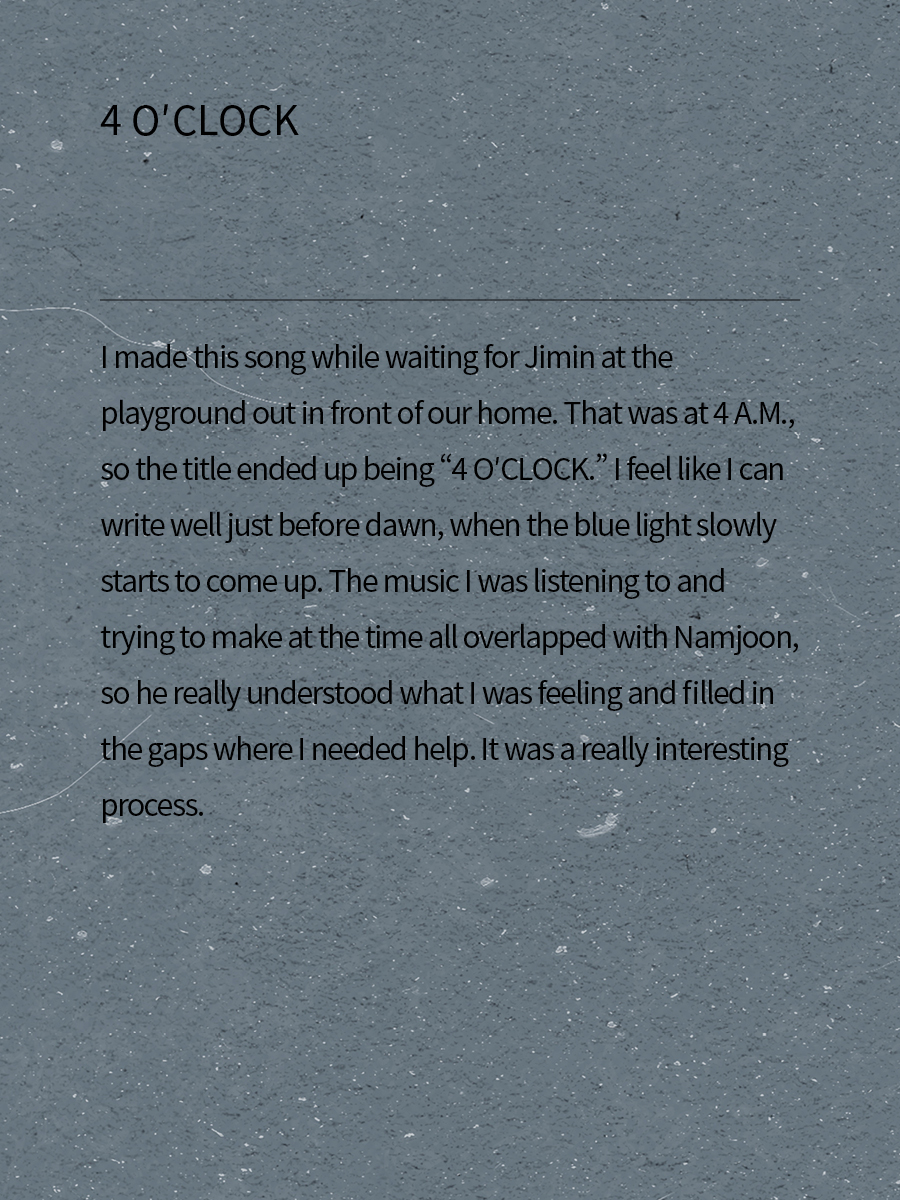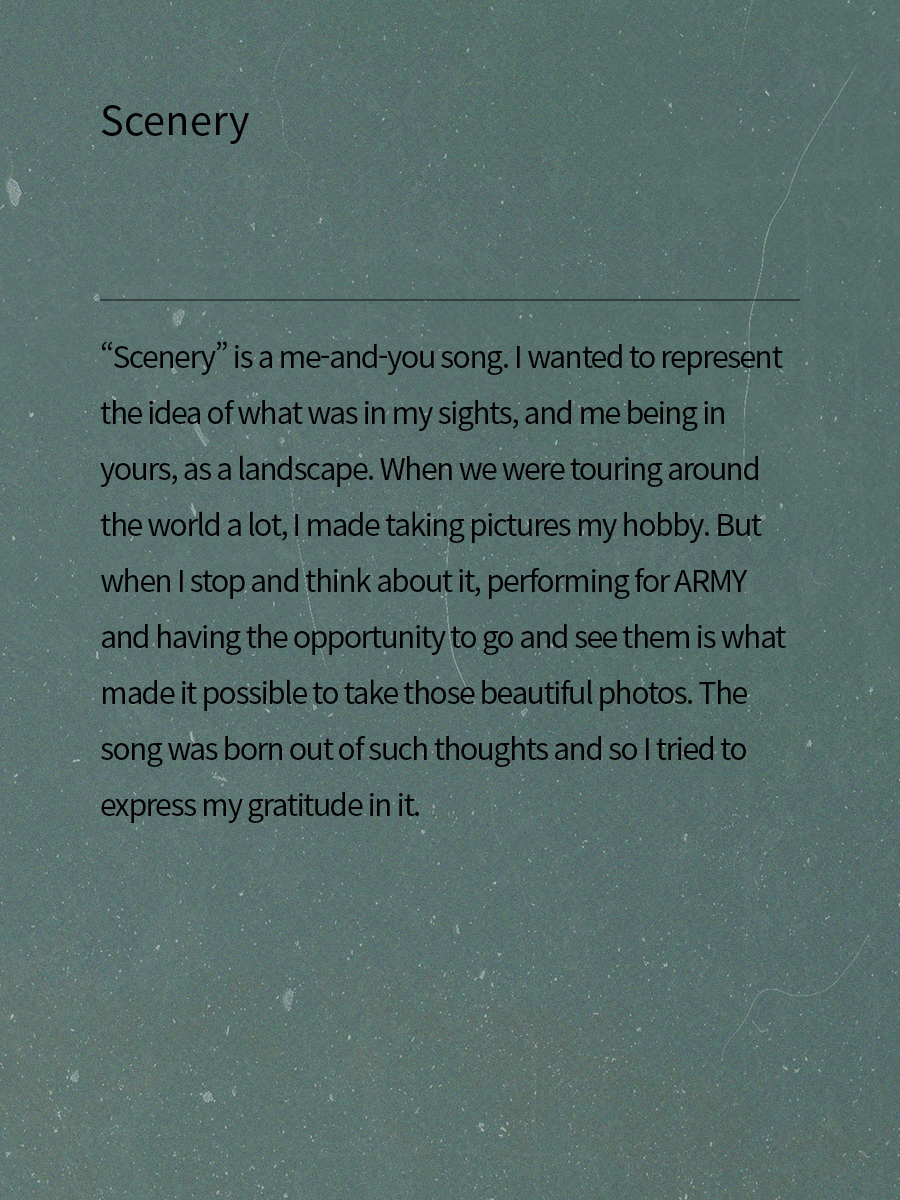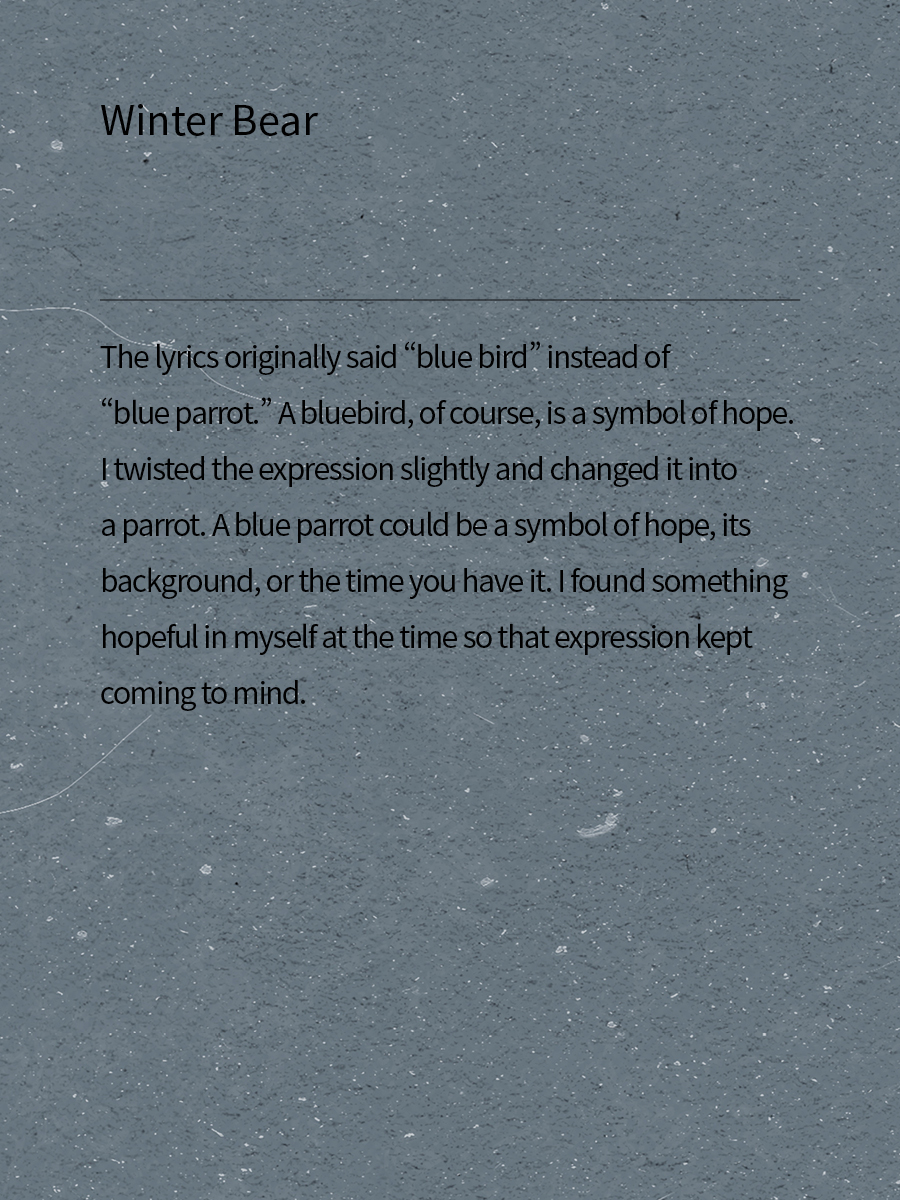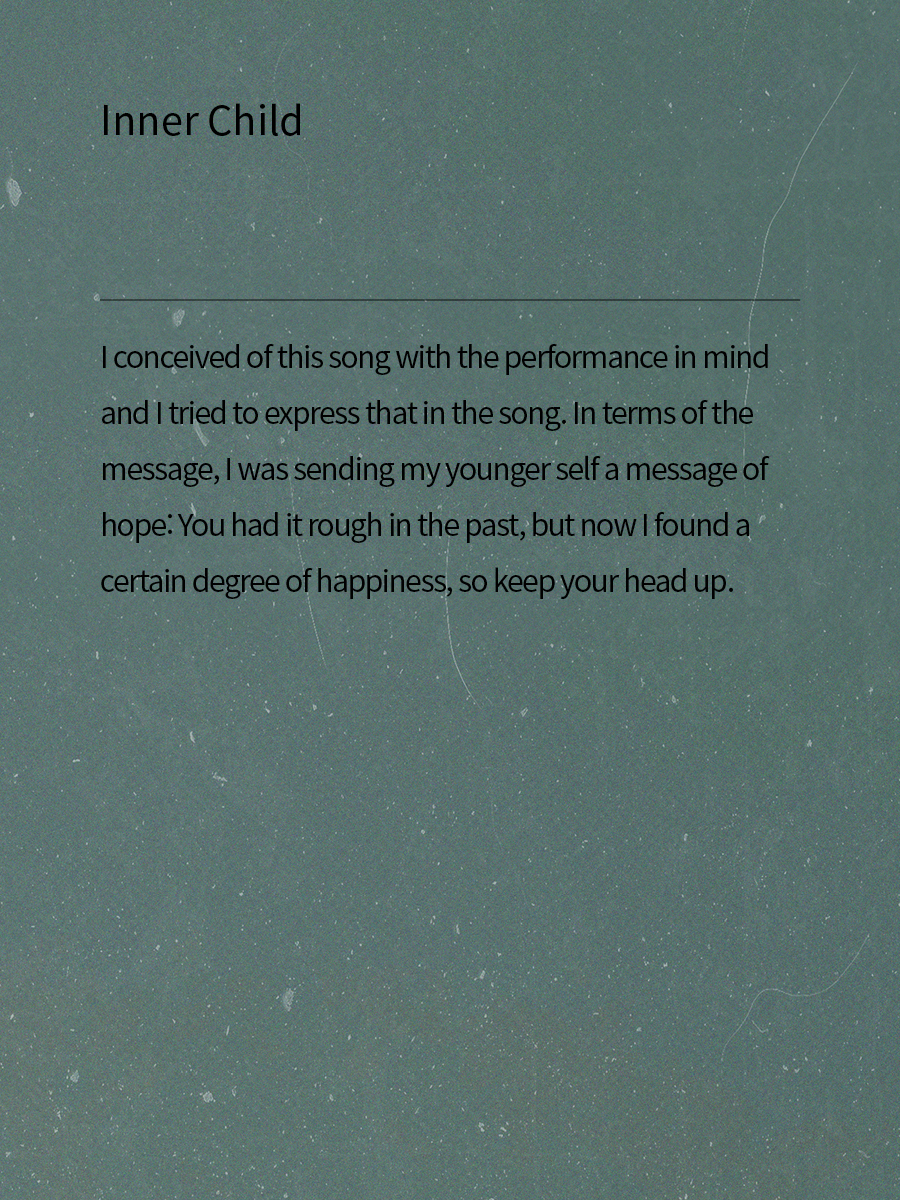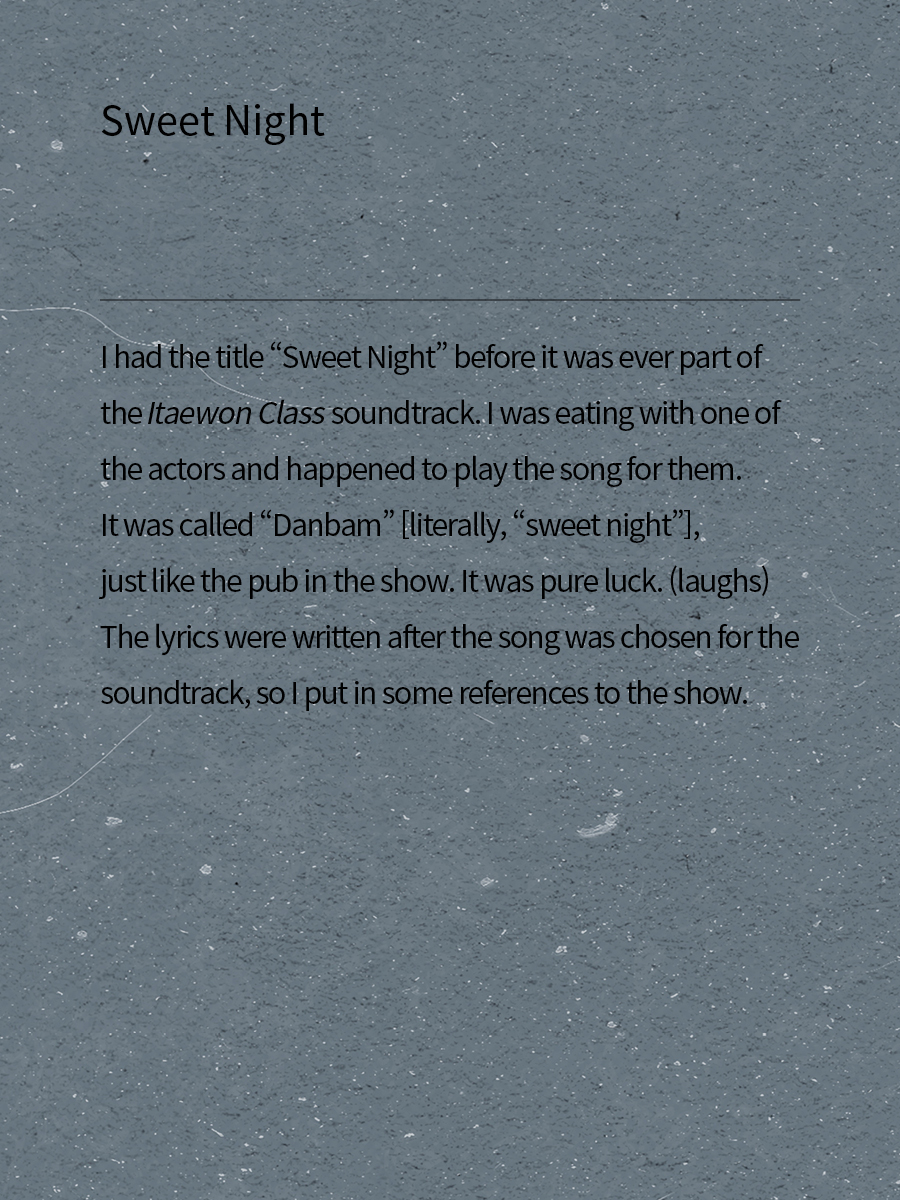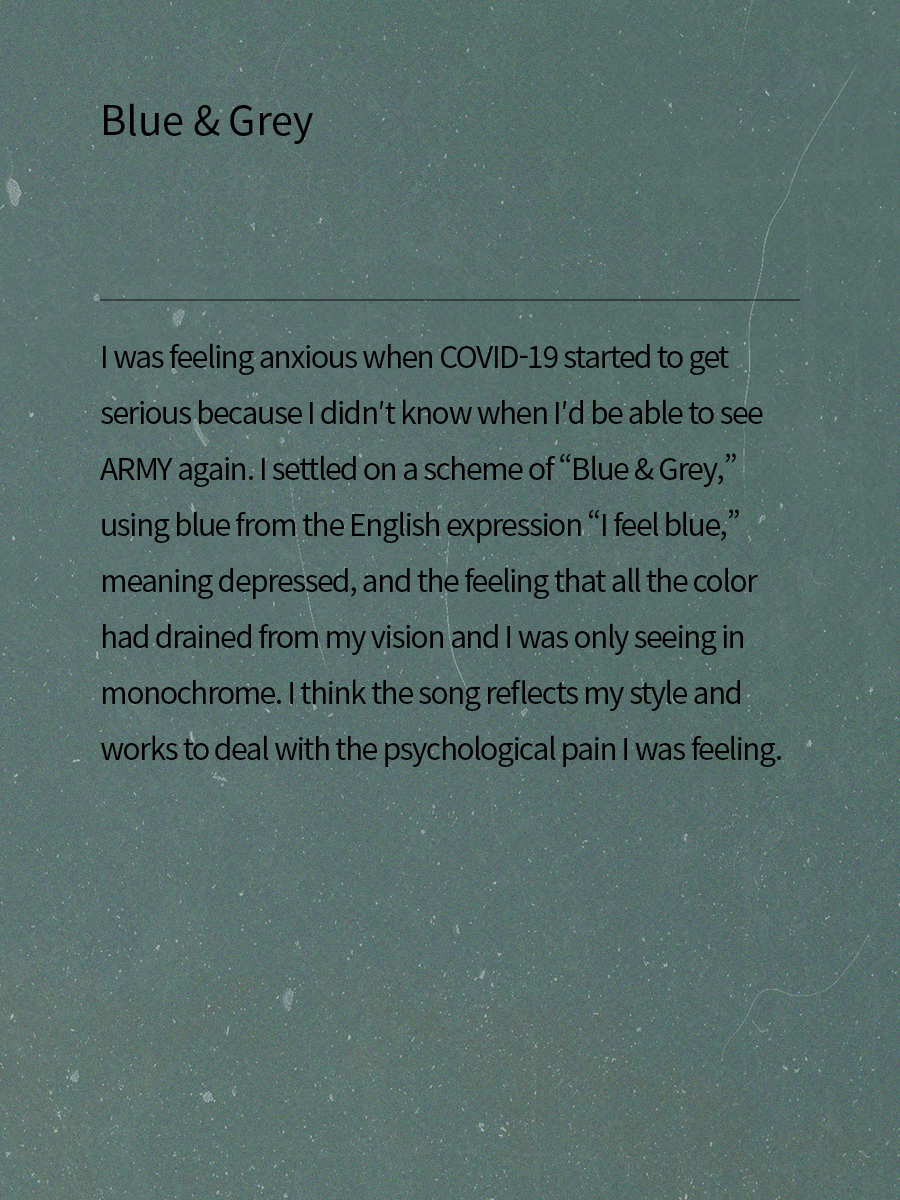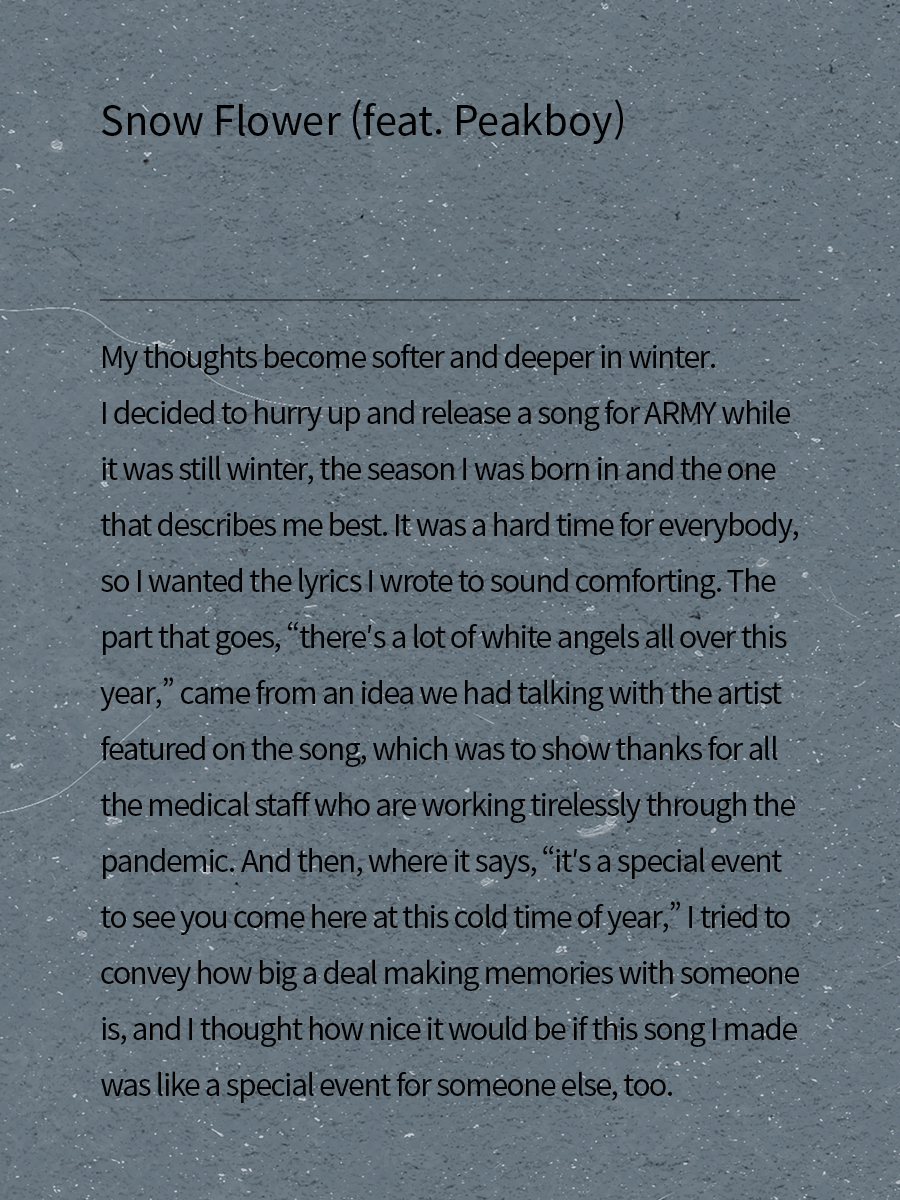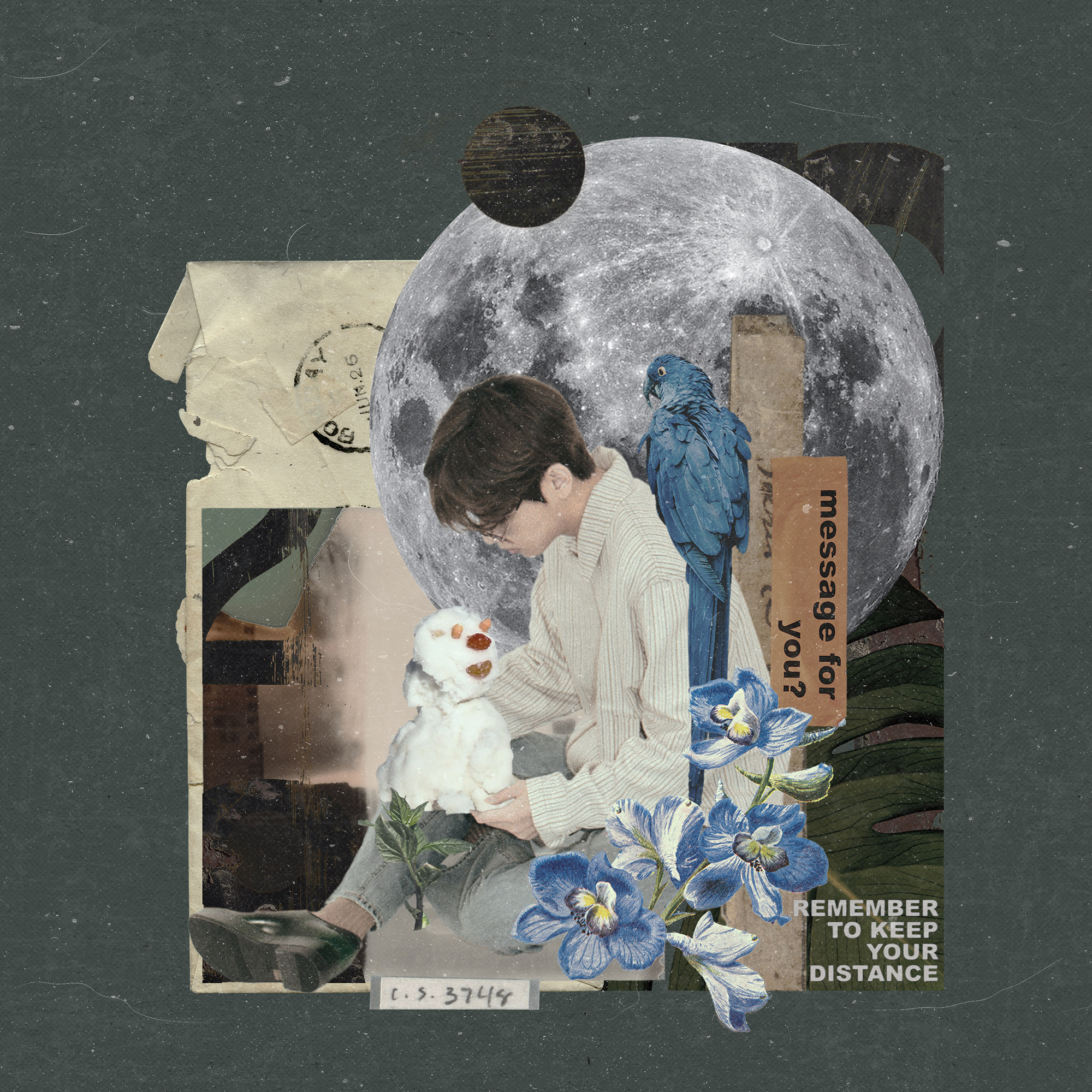
In the landscapes V paints with his music, white space places an integral role. The lyrics to “4 O’CLOCK,” a collaborative effort between RM and V, employs the imagery of waiting for someone as the dawn rises, while the song “Scenery” gives voice to regrets over not sharing enough “moments” with one another. The characters in “Sweet Night” share a moment in a scene unfolding on the beach and on a boat. Yet these scenes don’t take place in the present but in the past. Just as this landscape painting is only complete once someone walks in, V’s music often provides listeners with a space in which to fully immerse themselves. In the chorus of “Scenery,” a sparse reverb surrounds each syllable of the melodic vocals, carving out a sorrowful space in the song. “Sweet Night” has a linear composition, making the exact line between the first and second verse indistinct, and ends not with a climax but with feelings of love so strong it hurts scattered far and wide. V’s solo music forms synesthetic images from the feelings that arise in someone’s absence.
“I hoped ARMY would picture something for themselves when they listen to my music, even if there was nothing specific to look at,” V told Weverse Magazine about “Scenery,” “just like listening to a movie soundtrack reminds people of images from the movie itself.” This reveals something about what he’s aiming for in his work as an artist in change of his music. It was his idea to include sounds like the wind, wind chimes, walking on snow, and a camera shutter—sounds that evoke specific places and actions—in the song. These sounds align with the lyrics, “I still wander wander next story,” conjuring up images of the way the speaker walks around to capture moments with the person they’re with. V said it was also his idea to use acoustic instruments and whistling in “Sweet Night” to convey a sense of longing. He also explained how he eschewed the verse–pre-chorus–chorus structure so prominent in pop music in favor of a serene, flowing melody in order to convey “comfort that’s anything but stereotypical” and, as the title suggests, “hoping to have sweet dreams.” With V at the helm, his songs bring everyday emotions that are difficult to seize upon to life through a diverse use of lyrics, melody and sound. In his words, they’re like films captured in song.
The protagonists in his films are often placed in a situation where they’re disconnected from someone else: the lyrics in “Scenery” imply the speaker can no longer stay together with the unseen listener (“if you go with only your footprints left behind”); in the lullaby-like “Winter Bear,” that listener can’t respond because they’re asleep; despite its title, “Sweet Night” describes a sleepless night spent alone in bed. “I like the feeling of longing,” V said. “When I’m alone, it makes me think beautiful thoughts. I could be longing for performing, or it could be directed toward the other members, or I could be feeling overwhelming affection. But, anyway, those beautiful feelings collect one by one and become a song.” In other words, the disconnection comes from a feeling of longing—one where we hope we can hold onto that small spark that triggers a fleeting moment of warmth forever. V’s music, like movies, expresses moments through a combination of sound and lyrics, and in doing so shows an unwavering feeling of missing someone and agonizing over their absence even with the passage of time or while moving from place to place.
V also discussed the theme of his first solo song, “Stigma,” for which he participated in writing the lyrics and the chorus. “I wanted to portray someone young, still growing up, crying out in anguish—that feeling of wanting to thrash about and tell the world you’re tired and fed up,” he said, describing the kind of emotional growing pains that are sharply illustrated in the song as “pieces of glass forever shattered.” Yet in the songs he later released as side projects, like “4 O’CLOCK” and “Scenery,” V shifts his focus from inner turmoil and toward waiting for others, leading to songs like “Winter Bear” and “Sweet Night,” which are essentially monologues to people who are either asleep or simply nowhere to be found. Whether externalizing who he was long ago into the story of a young boy (“Inner Child”) or addressing his pain by comparing his depressive state to different colors (“Blue & Grey”), the songs all put distance between him and his emotions, and in this way, overcome them. V also said that “the young person in ‘Stigma’ passed through ‘Singularity’ and ‘Inner Child’ and grew up.” It’s no coincidence, then, that his latest song, “Snow Flower,” featuring Peakboy, takes the form of a direct conversation where someone is comforting another. The speakers in these songs that V helped write the lyrics and music for are faithful to their emotions and show increasing maturity: In time, they gradually turn their gazes outward, eloquently expressing their longing in beautiful terms, even when separated from someone, and externalizing their pain. In the end, V’s sense of longing is a way of looking at the pain and at specific moments that come with growing up. “A lot of the songs I release were written with youth in mind,” he said. “I thought it’d be nice if these songs I’m making now could bring comfort to my younger self.”
V’s songs “have expressed the things he has wanted to say at different stages of his life and reflect the music he liked at the time,” one of BTS’ producers, Pdogg, said, shedding some light on V’s musical journey as a solo artist. He recalled when V showed him a draft of “4 O’CLOCK”: “I thought, Aha, this guy’s found his own sound.” Pdogg also called “Scenery” an important turning point for the artist. “That’s when V started giving his opinions on the mixing,” he said. “Evidently he reviews the music carefully and he’s become clear about the direction and emotion he envisions.” Producer Hiss Noise, meanwhile, worked with V on “Winter Bear” and “Sweet Night.” “I think your thoughts about the music have to be clear if you’re going to get good music,” he said. “I think that’s why V is able to make good music, in that respect—because he has a good idea what kind of music he wants to do.” According to Hiss Noise, it’s because “Winter Bear” is the kind of “song that shows V’s emotions” that he was able to give it its unique composition where roughly half of the song is an instrumental. “Since the song had a different vibe from those on their albums, I wanted to approach the music a little differently, which V liked, too.”
Hiss Noise also revealed how he devoted careful attention to different aspects of the audio while working on “Sweet Night” to express V’s characteristic emotions. He explained how the ringing tucked behind the humming in the song is meant to represent “the stars in the night sky” and that the strings that start on the line, “I’m wondering, are you my best friend,” are there to capture the melancholy and loneliness of the song. “I feel like typical ballad songs use strings quite a bit, relatively speaking, but for this song I thought it would be more suitable, emotionally, to keep the strings stripped down, so I decided to employ a string trio.” He called “Sweet Night” the “product of V’s leadership, from views on the musical elements to the theme,” adding, “Naturally, artists’ ideas get reflected in their album work all the time, but for a personal project like ‘Sweet Night,’ their tastes really influence the production.”
V first demonstrated his strength as a solo artist on “Stigma” and “Singularity,” two tracks included on BTS’ albums. “Because I was thinking ahead for the accompanying performance, ‘Singularity’ ended up being a song completely full of syllables with no white space,” V said, highlighting one of the considerations often made for BTS songs. “If there wasn’t going to be a performance, it would have ended up a completely different song.” For that reason, he adjusted the strength of the vocals to make the grooviest track possible within the constraints of the soul vocals and slow beat to allow room for the performance. “We tried it out because V was more into R&B and soul at the time, and his deep, bassy, mellow vocals also fit the genre well,” Pdogg revealed. “It’s extremely hard to groove to a song like ‘Singularity’ when the rhythm’s got a sort of lay back and there are so many intricate parts. Most of all, it had to feel seductive, so we even turned off all the lights when we recorded it.” But V said he puts a lot of value on “white space” when it comes to recording songs released on his own and separately from the group, like “Scenery,” “Winter Bear” and “Sweet Night.” “I tried not to pack my personal songs with too many syllables,” he said. “There were parts that I could express better and sounded more polished when there was some white space,” and so, in songs like these, his vocals are relatively relaxed and focused on expressing the lyrics in a soothing way. Consequently, his voice has all the softness of a young boy, unlike the deep, dark voice he uses in “Singularity” and “Stigma.” Pdogg said he helped V find a voice by “concentrating on retaining the meaning and emotion behind each line of the lyrics rather than giving him any particular direction. The songs V worked on really expressed his emotions well, so I tried to hold onto that good emotive power.” The direction for V’s vocals will vary depending on the direction and intention of each song, and when it comes to songs about his own emotions in particular, they become a waymark to help the listener to more intuitively understand the pictures the music paints.
The songs V has been making and performing since the release of his first solo song, “Stigma,” helped him to grow, and are a beautiful tribute to the ups and downs he’s experienced as both a member of BTS and as Kim Taehyung himself as well as a process of looking long and hard at the pain brought on by past disconnections, all expressed through a filter of longing. During that time, his music paved the way for a unique voice in the world of music. The songs are captivating right from their opening measures, with V’s deep voice, the images straight out of a movie script, and the composition that is able to convey unique emotions that fill the listener with complicated feelings resting somewhere between sadness and an emotional cleanse. V only provided the vocals for his latest song, “Christmas Tree,” which was featured on the soundtrack to the SBS television series Our Beloved Summer, but Nam Hye Seung, the song’s director, listened to V’s music right from the planning stages and made the song with him in mind from the beginning. The result was a song that touches on the emotions V had already exuded in his existing songs. “I was really grateful that Nam Hye Seung, the music director, wrote the song just for me,” V said, “and I also really appreciated that she listened to my music and understood my style from listening to just a few of my songs.” V’s catalog of songs has slowly but surely grown over time, and already other musicians can get a clear feel for the image of his music. His unique voice carries through the air like the music of a windchime, and his catalog is a portrait of the young man as an artist—one beautifully painted with a voice that captures the pain of experience and the longing that soothes it.
Unauthorized reproduction and distribution prohibited.
